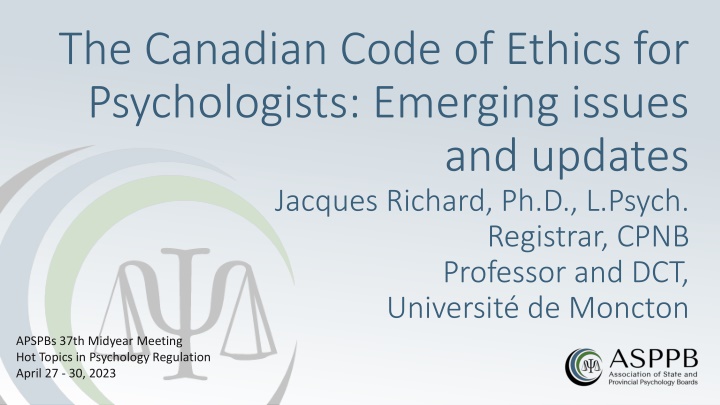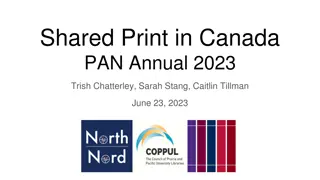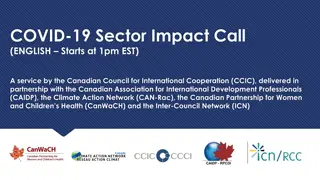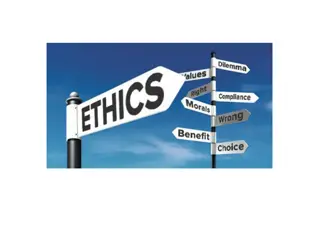Canadian Psychologists' Code of Ethics Updates
The Canadian Code of Ethics for Psychologists addresses current issues like social justice, EDI, and telepsychology through core principles. While there have been no recent updates to the code since 2017, regulatory bodies and organizations are incorporating these principles into their codes of conduct. The principles of respect for dignity and responsible caring are key components guiding ethical decision-making in psychology practices.
Uploaded on Mar 19, 2025 | 1 Views
Download Presentation

Please find below an Image/Link to download the presentation.
The content on the website is provided AS IS for your information and personal use only. It may not be sold, licensed, or shared on other websites without obtaining consent from the author.If you encounter any issues during the download, it is possible that the publisher has removed the file from their server.
You are allowed to download the files provided on this website for personal or commercial use, subject to the condition that they are used lawfully. All files are the property of their respective owners.
The content on the website is provided AS IS for your information and personal use only. It may not be sold, licensed, or shared on other websites without obtaining consent from the author.
E N D
Presentation Transcript
The Canadian Code of Ethics for Psychologists: Emerging issues and updates Jacques Richard, Ph.D., L.Psych. Registrar, CPNB Professor and DCT, Universit de Moncton APSPBs 37th Midyear Meeting Hot Topics in Psychology Regulation April 27 - 30, 2023
Have there been any recent updates to the Canadian Code of Ethics to address current or hot topic issues such as social justice, EDI, telepsychology ? Short answer: no (the current Code has not changed since 2017) However: the current Code already addresses some of these issues Regulatory bodies in Canada (both individually and as part of the ACPRO group) have addressed some of these issues by incorporating core principles of the Code of Ethics in updates to their Codes of Conduct CPA is currently drafting and updating Guidelines (to accompany the Code) to address some of these issues 37th Midyear Meeting Denver, Colorado April 27 - 30, 2023
Canadian Code of Ethics for Psychologists (4th edition) The Code is organized around four ethical principles to be considered and balanced in ethical decision making Statement of values that define each principle Principle List of values included within each principle List of ethical standards applied to each value
Principle I: Respect for the Dignity of Persons and Peoples This principle, with its emphasis on inherent worth, non- discrimination, moral rights, distributive, social and natural justice, generally should be given the highest weight, except in circumstances in which there is a clear and imminent danger of bodily harm to someone. 37th Midyear Meeting Denver, Colorado April 27 - 30, 2023
Principle II: Responsible Caring This principle generally should be given the second highest weight. Responsible caring requires competence, maximization of benefit, and minimization of harm, and should be carried out only in ways that respect the dignity of persons and peoples. 37th Midyear Meeting Denver, Colorado April 27 - 30, 2023
Principle III: Integrity in Relationships This principle generally should be given the third highest weight. Psychologists are expected to demonstrate the highest integrity in all of their relationships. However, in some circumstances, Principle III values (e.g., openness, straightforwardness) might need to be subordinated to the values contained in the Principles of Respect for the Dignity of Persons and Peoples, and Responsible Caring. 37th Midyear Meeting Denver, Colorado April 27 - 30, 2023
Principle IV: Responsibility to Society Although it is necessary and important to consider responsibility to society in every ethical decision, adherence to this principle needs to be subject to and guided by Respect for the Dignity of Persons and Peoples, Responsible Caring, and Integrity in Relationships. When the welfare of an individual or group appears to conflict with benefits to society, it is often possible to find ways of working for the benefit of society that do not violate respect for dignity, responsible caring or integrity. However, if this is not possible, the dignity, well-being and best interests of persons and peoples, and integrity in relationships should not be sacrificed to a vision of the greater good of society. 37th Midyear Meeting Denver, Colorado April 27 - 30, 2023
The CPA Code of Ethics and Social Justice 37th Midyear Meeting Denver, Colorado April 27 - 30, 2023
Concepts related to social justice that are defined in the Code s preamble (1) Moral rights means the fundamental and inalienable rights of persons and peoples Of particular significance to psychologists are moral rights to cultural identity, cultural survival, and social participation; and distributive, social, and natural justice. 37th Midyear Meeting Denver, Colorado April 27 - 30, 2023
Concepts related to social justice that are presented in the Code (2) Unjust discrimination means activities that are prejudicial to or promote prejudice against persons or peoples because of their culture, nationality, ethnicity, colour, race, religion, sex, gender, marital status, sexual orientation, physical or mental abilities, age, socio-economic status, or any other preference or personal characteristic, condition, or status. The word unjust is used to differentiate such activities from the justifiable recognition and understanding of differences needed to determine, for instance, what might benefit or harm persons and peoples. 37th Midyear Meeting Denver, Colorado April 27 - 30, 2023
Concepts related to social justice that are presented in the Code (3) Vulnerable refers to individuals or groups whose dignity, well- being and best interests are more easily violated due to such factors as: (a) characteristics of the individual or group (e.g., level of cognitive and emotional functioning; history of oppression) 37th Midyear Meeting Denver, Colorado April 27 - 30, 2023
Concepts related to social justice that are embedded within each core principle Principle I Respect for the Dignity of Persons and Peoples Principle II Responsible Caring Principle III Integrity in Relationships Principle IV Responsibility to Society 37th Midyear Meeting Denver, Colorado April 27 - 30, 2023
Principle I Respect for the Dignity of Persons and Peoples Repeatedly mentions social justice as a form of justice to which persons and social groupings are entitled Built on the concept that all human beings are of equal inherent worth With the addition of Peoples in 2017, rights and entitlements to justice are extended to social and cultural groupings Principle I also states that psychologists should take into consideration an individual or group s history of discrimination or oppression due to culture or other factors 37th Midyear Meeting Denver, Colorado April 27 - 30, 2023
Examples of specific ethical standards related to Principle I I.2 Not engage publicly (e.g., in public statements, presentations, research reports, with primary clients or other contacts) in degrading comments about others, including demeaning jokes based on such characteristics as culture, nationality, ethnicity, colour, race, religion, sex, gender, or sexual orientation. I.22 Accept and document non-written consent (e.g., oral, a verbal agreement, a handshake or other culturally normative exchange) in situations in which signed consent forms are not acceptable culturally... I.46 Encourage others, in a manner consistent with this Code, to respect the dignity of persons and peoples, and to expect respect for their own dignity. 37th Midyear Meeting Denver, Colorado April 27 - 30, 2023
Relationship of the Code to Personal Behaviour This Code is intended to guide and regulate only those activities a psychologist engages in by virtue of being a psychologist. There is no intention to guide or regulate a psychologist s activities outside of this context, although an individual psychologist might make a personal decision to be guided by the Code s principles and values outside of this context. Personal behaviour becomes a concern of the discipline only if it is of such a nature that it undermines public trust in the discipline as a whole or if it raises questions about the psychologist s ability to carry out appropriately his/her responsibilities as a psychologist. p.7 37th Midyear Meeting Denver, Colorado April 27 - 30, 2023
Principle II Responsible Caring Reiterates that our greatest responsibility is to those in the most vulnerable position as it relates to conflict with the best interests and well-being of other individuals or groups, especially those with more power. Reminds us that we need to ensure that we are sufficiently sensitive to and knowledgeable about culture, individual and group characteristics, and vulnerabilities (including those resulting from various forms of oppression). Advises us to be aware about how our own experiences, culture, social context, and background might influence our efforts to benefit and not harm others. 37th Midyear Meeting Denver, Colorado April 27 - 30, 2023
Examples of specific ethical standards related to Principle II II.10 Evaluate how their own experiences, attitudes, culture, beliefs, values, individual differences, specific training, external pressures, personal needs, and historical, economic, and political context might influence their interactions with and perceptions of others, and integrate this awareness into their efforts to benefit and not harm others. II.14 Be sufficiently sensitive to and knowledgeable about individual and group characteristics, culture, and vulnerabilities to discern what will benefit and not harm the individuals and groups (e.g., couples, families, organizations, communities, peoples) 37th Midyear Meeting Denver, Colorado April 27 - 30, 2023
Principle III Integrity in Relationships Although it can be argued that science is value-free and impartial, scientists are not. Personal values and self-interest can affect the questions psychologists ask, how they ask those questions, what assumptions they make, their selection of methods, what they observe and what they fail to observe, and how they interpret their data. (CPA Code of Ethics, p. 25) Importance of recognizing and not participating in any form of exploitation of others due to the power imbalances inherent in our service, research, teaching and other activities. 37th Midyear Meeting Denver, Colorado April 27 - 30, 2023
Example of a specific ethical standard related to Principle III III.9 Evaluate how their own experiences, attitudes, culture, beliefs, values, individual differences, specific training, external pressures, personal needs, and historical, economic, and political context might influence their activities and thinking, integrating this awareness into their attempts to be as objective and unbiased as possible in their research, service, teaching, supervision, employment, evaluation, adjudication, editorial, and peer review activities. 37th Midyear Meeting Denver, Colorado April 27 - 30, 2023
Principle IV Responsibility to Society Psychologists, both in their work and as private citizens, have responsibilities to the societies in which they live or work and to the welfare of all human beings in those societies. (CPA Code of Ethics, p. 31) if structures or policies seriously ignore or oppose the principles of respect for the dignity of persons and peoples, responsible caring, integrity in relationships, or responsibility to society, psychologists involved have a responsibility to speak out in a manner consistent with the principles of this Code, and advocate for appropriate change to occur as quickly as possible. (CPA Code of Ethics, p. 31) 37th Midyear Meeting Denver, Colorado April 27 - 30, 2023
Examples of specific ethical standards related to Principle IV IV.15 Acquire an adequate knowledge of the culture, social structure, history, customs, and laws or policies of organizations, communities, and peoples before beginning any major work there, obtaining guidance from appropriate members of the organization, community, or people as needed. IV.16 In their scientific and professional activities, convey respect for and abide by prevailing mores, social customs, and cultural expectations of organizations, communities, and peoples, provided that this does not contravene any of the ethical principles of this Code. 37th Midyear Meeting Denver, Colorado April 27 - 30, 2023
The relationship between the Canadian Code of Ethics and provincial Codes of Conduct The Canadian Code of Ethics is used by all Regulatory bodies in the country, with the exception of Quebec which has it s own Code The Code is aspirational and intended to serve as an umbrella document for the development of provincial/territorial Codes of Conduct. As stated in the Code, the Code could be used as an ethical framework for the identification of behaviours that would be considered enforceable in a jurisdiction, the violation of which would constitute misconduct; or jurisdictions could identify those standards in the Code that would be considered of a more serious nature and, therefore, reportable and subject to possible discipline. 37th Midyear Meeting Denver, Colorado April 27 - 30, 2023
ACPRO Statement (November 2022) https://acpro-aocrp.ca/association-of-canadian-psychology- regulatory-organizations-acpro-supports-equity-diversity-and- inclusion-through-the-promotion-of-health-equity-and-cultural- humility/
Excerpts from ACPRO Statement (1) The Association of Canadian Psychology Regulatory Organizations (ACPRO) supports equity, diversity and inclusion and invites all regulated members of the profession of psychology in Canada to stand up, speak out and to work collaboratively to eradicate all forms of racism and discrimination. We advocate that all psychology regulatory bodies commit to identifying regulatory practices that promote equity, diversity and inclusion. psychologists should be fully aware of the valuable contribution they can make to promoting Health Equity and Cultural Humility as means to ensure the safe, ethical, and competent provision of services to the public. 37th Midyear Meeting Denver, Colorado April 27 - 30, 2023
Excerpts from ACPRO Statement (2) becoming informed about the Truth and Reconciliation Commission s calls to action by recognizing the current and historical injustices suffered by Indigenous peoples as well as the need for psychologists working in these communities to engage in culturally sensitive, safe and competent practice all Canadians, including psychologists, have a responsibility for acknowledging past harms, maintaining respectful relationships, and engaging in practices that promote long-term reconciliation. 37th Midyear Meeting Denver, Colorado April 27 - 30, 2023
Excerpts from ACPRO Statement (3) ...prohibition against any treatment or service designed to change or modify the sexual orientation, gender identity or expression of an individual. The overall intent is to ensure that persons, peoples and communities that share a common identity are both respected and protected. The effects of racism and other forms of discrimination are known to have multiple adverse mental health outcomes. ACPRO advocates an ethical and professional framework that highlights the importance of respecting all individuals, peoples and communities. This framework specifically prohibits discrimination based on race, colour, ethnicity, religion, gender, or sexual orientation. 37th Midyear Meeting Denver, Colorado April 27 - 30, 2023
Excerpts from NBs Code of Conduct (1) III. 11. 1. Selecting appropriate intervention. The psychologist shall choose the appropriate intervention for the client based on the client s history, cognitive abilities, vulnerabilities, presenting problem and cultural background, in order to minimize risk and maximize benefits. III. 11. 3. Stereotyping/prejudicial/discriminatory. The psychologist shall not impose on the client any stereotypes, prejudicial or discriminatory behaviors, values or roles related to age, gender, religion, race, disability, nationality, sexual orientation or diagnosis which would interfere with the objective provision of psychological services to the client. Psychologists shall hold themselves to a standard where they exude cultural safety and cultural sensitivity in all the work that they do. 37th Midyear Meeting Denver, Colorado April 27 - 30, 2023
Excerpts from NBs Code of Conduct (2) III. 11. 7. Truth and reconciliation. The psychologist shall take reasonable steps to familiarize themselves with the current and historical injustices suffered by indigenous peoples on behalf of Canada and the field of psychology prior to providing services to ensure all professional activities are performed in a culturally competent manner. This includes recognizing and respecting indigenous ways of knowing and traditional approaches to healing and wellness. 37th Midyear Meeting Denver, Colorado April 27 - 30, 2023
INTERIM ETHICAL GUIDELINES FOR PSYCHOLOGISTS PROVIDING PSYCHOLOGICAL SERVICES VIA ELECTRONIC MEDIA
INTERIM ETHICAL GUIDELINES FOR PSYCHOLOGISTS PROVIDING PSYCHOLOGICAL SERVICES VIA ELECTRONIC MEDIA - Excerpts (1) When obtaining informed consent for electronic provision of services, psychologists include information about the particular nature, risks (including possible insufficiency, misunderstandings due to lack of visual clues, and technology failure), benefits (including appropriateness and advantages re distance, convenience, comfort), reasonable alternative service options (e.g., in-person services, local services from an available health service provider of another discipline), and privacy limitations (including the possibility of interception of communications) of providing services through the particular electronic medium/media to be used. (Informed Consent) 37th Midyear Meeting Denver, Colorado April 27 - 30, 2023
INTERIM ETHICAL GUIDELINES FOR PSYCHOLOGISTS PROVIDING PSYCHOLOGICAL SERVICES VIA ELECTRONIC MEDIA - Excerpts (2) Psychologists inform clients of their security practices, and reach agreements with clients regarding maximization of security for each client, including whether the client will require any special equipment (e.g., special software) to access and transmit information and, if so, whether the psychologist provides the special equipment as part of the services. (Privacy, Confidentiality) Psychologists keep up to date with the e-service literature, including research literature regarding the efficacy and effectiveness of services using electronic media, and take this literature into consideration when deciding what services to provide to which clients, with what methods, and under which circumstances. (Competence, Maximize Benefit) 37th Midyear Meeting Denver, Colorado April 27 - 30, 2023
INTERIM ETHICAL GUIDELINES FOR PSYCHOLOGISTS PROVIDING PSYCHOLOGICAL SERVICES VIA ELECTRONIC MEDIA - Excerpts (3) Prior to beginning e-service, the psychologist obtains from the client the name and phone number(s) of someone for the psychologist to contact in an emergency. (Maximize Benefit, Minimize Harm) Psychologists inform clients of alternative communication procedures if there is a technology failure. (Maximize Benefit, Minimize Harm) Psychologists ensure that the possible convenience and financial advantages of providing e-services are never allowed to outweigh the best interests of clients. (Avoidance of Conflict of Interest) 37th Midyear Meeting Denver, Colorado April 27 - 30, 2023
INTERIM ETHICAL GUIDELINES FOR PSYCHOLOGISTS PROVIDING PSYCHOLOGICAL SERVICES VIA ELECTRONIC MEDIA - Excerpts (4) Psychologists inform themselves of jurisdictional requirements regarding licensure or certification, and are licensed or certified in any jurisdiction that requires licensure or certification of psychologists providing e-services to persons who reside in that jurisdiction. This may include being licensed or certified both in a client s home jurisdiction, as well as being licensed or certified in the psychologist s own home jurisdiction. (Reliance on the Discipline) Psychologists familiarize themselves with and honour the relevant laws and regulations of all jurisdictions to which they provide e-services. This includes such matters as age of consent or definitions of capacity to consent, and requirements for mandatory reporting. (Respect for Society) 37th Midyear Meeting Denver, Colorado April 27 - 30, 2023
Other guidelines that are currently being drafted or updated by CPA GUIDELINES FOR NAVIGATING OVERLAPPING RELATIONSHIPS IN RURAL, NORTHERN, AND REMOTE CANADIAN COMMUNITIES (NEW GUIDELINES BEING DRAFTED FOR THE FIRST TIME) GUIDELINES FOR NON-DISCRIMINATORY PRACTICE Microsoft Word - NonDiscPractrev cpa.doc GUIDELINES FOR SUPERVISION CoEGuidelines_Supervision2017_final.pdf (cpa.ca)
References Calavez, S. & Hunter, P. (2019). Psychologists called to act on ethical principles. Psynopsis, 41(3), 34. Canadian Psychological Association (2017). Canadian code of ethics for psychologists (4th ed.). Eskie, K. &. Sinacore, A.I. (Eds.) (2020). Human rights and social justice: Addressing systemic discrimination, oppression and marginalization. Psynopsis, 42(4). Sinclair, C. & McMurtry, M. (2022). Social justice and the Canadian Code of Ethics for Psychologists. Psynopsis, 44(2), 25-26.























